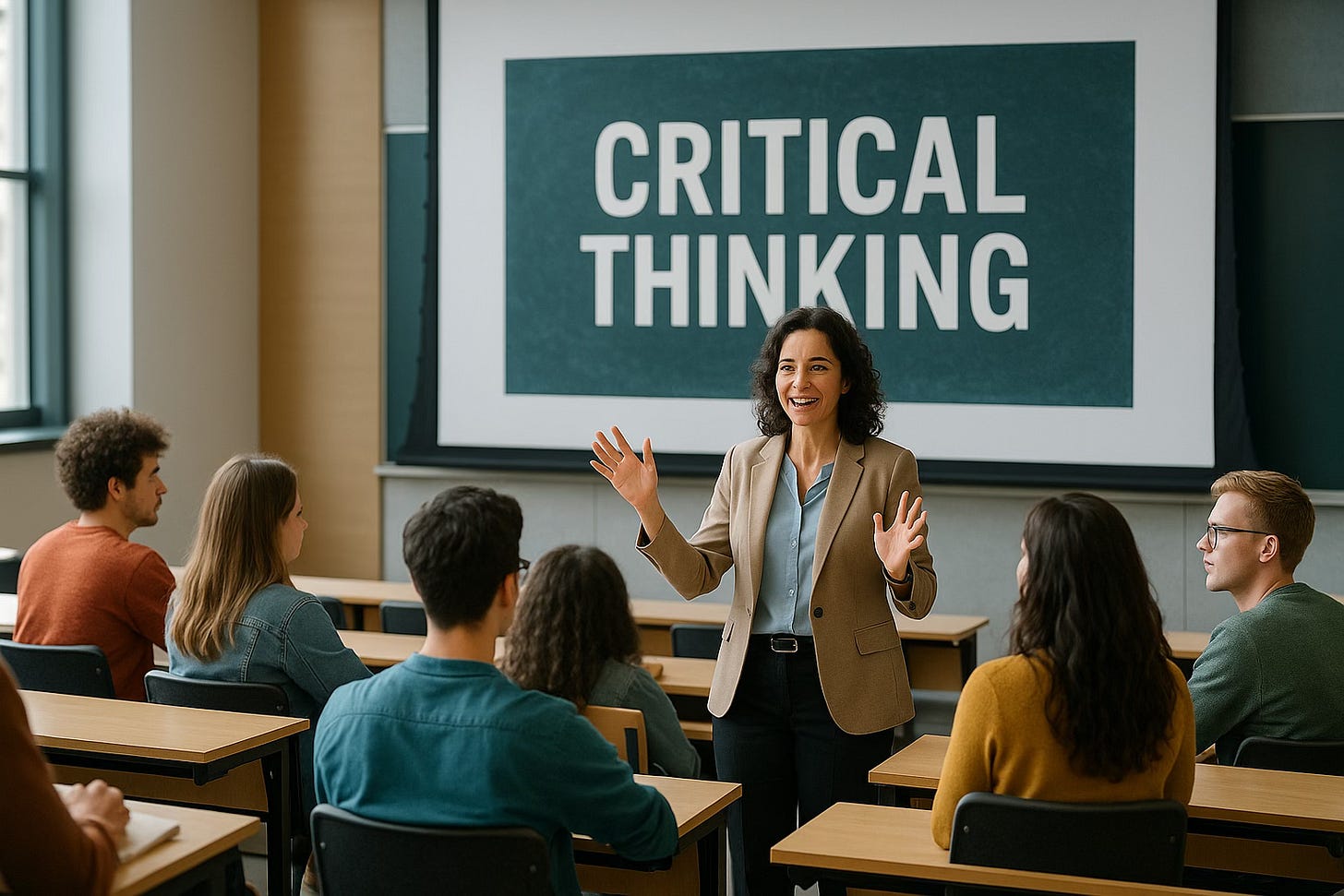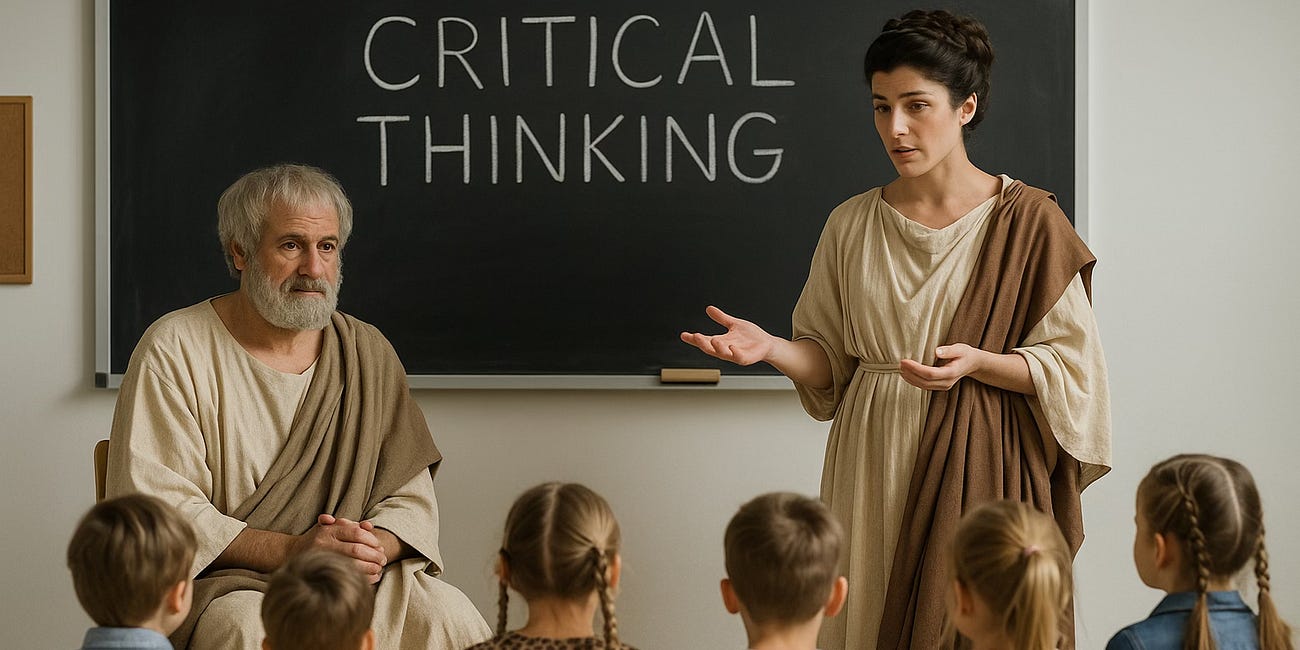The Trouble with the Attention Economy
The attention economy, both in intent and practice, is engineered to capture your focus through every feed and notification. It is optimised to sabotage your critical faculties by stimulating the production of neurotransmitters such as dopamine, as well as other techniques to influence your actions. This is not about increasing edification or enhancing social relations. It is to make the platform providers money, pure and simple. The primary means of achieving this is by using algorithms to assess your interests and then give you more content that is in line with them. All well and good, nothing wrong with giving people more of what they like. But as we all know, if all that people see is one side of a story then we are on the road to reinforcing information silos, increasing the polarisation of positions, creating ignorance, and the devaluing and demonisation of other views.
Philosophy to the Rescue
None of the classic academic subjects; maths, engineering, medicine, languages, etc. have an answer to this predicament. Disciplines such as psychology and sociology may offer a why and a how but they offer no counter-measures, neither in the present nor over time. However, a key component of philosophy, critical thinking, does offer a method, in fact, many methods to counteract the rot.
Critical thinking provides a toolkit of techniques that can be used in any context to examine claims, weigh evidence, account for the biases we all have and enable us to make deliberate, considered decisions rather than endure the slavery of mindless reactions. You can look at it as an operating system for attention.
Berkeley’s “To Be is to Be Perceived” and Reconstructive Memory
It is very fashionable for people to claim that philosophy is just people pontificating over matters of no consequence. Generally, university philosophy departments tend to be under-funded, and largely perceived to lack relevance in the job market, which is a terrible, narrow-minded mistake. Without philosophy we wouldn’t have the intellectual framework to examine the world properly. All of science and academia owe their existence to philosophy. Philosophy lies at the very foundation of the world we live in.
In 1710, George Berkeley, later to be an Irish bishop, argued in A Treatise Concerning the Principles of Human Knowledge that perceived objects have no existence independent of the mind. For things to exist they need to be perceived (esse est percipi). He is often trivialised with the false attribution that claimed the world comes in and out of existence roughly 8 - 20 times a minute; every time the average person blinks. But Berkeley’s real view was that memories are mind-bound ideas, which 264 years later, anticipated today’s commonly accepted view that remembering is a constructive, revisable process.
Modern cognitive science now shows that what we remember is not a factual replay of the past but a reconstruction guided by language and expectations. The seminal experimental 1974 paper, Reconstruction of Automobile Destruction by Elizabeth F. Loftus and John C. Palmer. In brief, they showed test subjects a film of a car accident. Depending on the phrasing of the follow-up questions, subjects would remember the original incident differently. This implies that recall is a constructive operation of the brain and not an accurate recording; memories are not fixed but exist as Berkeleyan ideas—reconstructed under the pressure of language and expectation.
This is just one example of the importance of having well-constructed ideas about the world. The point here is that philosophy is not an oracle that predicts the future but it provides a framework for thinking about the world that allows progress to happen however it may. It is the imaginative formulations of ideas, hypotheses in scientific circles, that allows the possibility and freedom to give birth to new ideas that would otherwise be fragmented and have no anchor. This enabling of intellectual freedom is what gives philosophy its power.
There are many techniques that provide the framework for clear and useful thinking. For the sake of space, I have outlined five but there are many more. Philosophers, being philosophers, will probably argue about them but we have to start somewhere.
Five Elements of Critical Thinking
Clarity of Claim: State exactly what is being asserted. Vagueness is the enemy here. The classic claim of “mistakes were made” has long been the get out clause for bureaucrats and other evildoers.
To counter obfuscation it is necesssary to nail down exactly what is being discussed. Supplemental questions such as, what supports this? How was it measured? Is the source primary? What’s the methodology? And so on.
Inference and Logic: Be clear to separate data from conclusion. Watch out for hidden assumptions and equivocation.
Counter-argument and Falsification: A useful trick here is to ask what would change your mind before you look. What is the level of evidence that you would accept, and be clear about it? A couple of guys in a bar might suffice for trivial matters. A series of highly-cited papers may be needed for other arguments.
Metacognition and Bias Awareness: Notice how you’re thinking: the role of attention, emotion, anchoring, confirmation, and social proof. We all have confirmation biases that are continually active. That is how humans are wired.
In another article that I wrote here on Substack, The Perils of AI Plausibility, I listed nearly all the critical thinking skills I encountered in my own undergraduate degree in philosophy. This is a truly enabling technology, for want of a better word. Learning these ideas and implementing them into your life is the only real way that we can resist the worst excesses of the attention economy. No other academic discipline can provide the thinking tools that philosophy can provide.
Core Critical Thinking Skills
Analysis – Breaking down arguments, claims, or evidence into components to understand structure and meaning.
Evaluation – Assessing the credibility, relevance, and strength of arguments and evidence.
Inference – Drawing reasonable and justified conclusions from available evidence and reasoning.
Explanation – Clearly and logically articulating reasons, evidence, and conclusions.
Interpretation – Understanding and clarifying meaning from data, arguments, or texts.
Self-regulation (Metacognition) – Monitoring, reflecting on, and adjusting one’s own thinking processes.
Identifying Assumptions – Recognizing unstated premises or beliefs underlying arguments.
Recognizing Bias and Fallacies – Detecting personal, social, or cognitive biases; identifying logical fallacies.
Problem-Solving – Applying structured reasoning to address complex or unfamiliar problems.
Decision-Making under Uncertainty – Making sound judgments even when information is incomplete or ambiguous.
Creative Thinking – Generating innovative approaches, alternative viewpoints, or novel solutions.
Effective Argumentation – Constructing well-reasoned, persuasive arguments that withstand scrutiny.
Common Tools and Frameworks
Socratic questioning
Argument mapping
Logical reasoning (deductive, inductive, abductive)
Probability and risk assessment
Ethical reasoning frameworks
Background Reading
Berkeley, G., (1710), A Treatise Concerning the Principles of Human Knowledge, https://www.maths.tcd.ie/~dwilkins/Berkeley/HumanKnowledge/1734/HumKno.pdf
Loftus & Palmer, (1974), Reconstruction of Automobile Destruction, https://labs.la.utexas.edu/gilden/files/2016/04/Loftus_Palmer.pdf.
Tom Murphy, (2025), The Perils of AI Plausibility,





It doesn't matter how many different angles we come at this subject, the cognitive work to make critical thinking cognitively reflexive is paramount for sense makers and leaders in an age of over saturation. We all need this. And it should all be self responsible, we should all have the ability to be self responsible in this - unfortunately this does not exist. We must do our best and enact methods to incline thought towards the truly rational in the framing of humility.
Great read. The tools of philosophy which are sooo lacking in public discourse amidst the chaos.. and the empowered agents of chaos!!